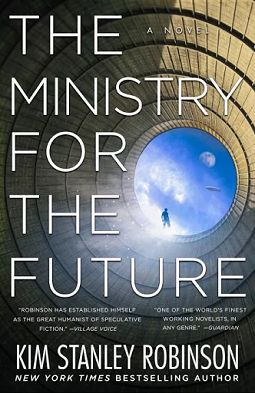The Ministry for the Future
by Kim Stanley Robinson, 2020
A Review: When India Bakes in Unprecedented Heat Waves, What Is The World to Do?
In The Ministry for the Future, it does not take long for the reader to wonder, is it already too late for our civilization, now confronted by its greatest challenge? By the third decade of the twenty-first century, Human greed had transformed our Earth into Anthropocene horrors. It was as if Saraswati had exchanged her comforting fan for one that delivers Agni’s fiery-heat to punished all for the sins of mankind. As early as 2020 we were well on the way, unleashing a climate crisis that may encompass the planet and transform our blue planet from a cradle for life to a world infested with hellish landscapes. Beginning in 2025, a record-shattering heat wave engulfed India causing more than 20-million people to perish in the north!

The world looked on in horror as we began to fear the collapse of civilization. Environmental degradation was altering the living Earth, awakening People to realities of our angry planet. Slowly at first, people began organizing, but all too slowly, as one might expect.
In India, however, the nation demanded fast action from their government, no excuses. They were not willing to put up with business as usual after the worst month in human history! Government responded with geoengineering to deflect sunlight, in defiance of an international treaty. They did it anyway. The prime minister’s scheme provided some relief; enough to raise hopes.
The United Nations set up an office in Switzerland to house a global organization to advocate for solutions on behalf of all people and life yet to be born. So, naturally, it quickly became known as the Ministry for the Future, headed by a strong-willed Irish diplomat. She bears a striking resemblance to a younger version of the former president of the Irish Republic. She dominated the remainder of the story.
After the Indian PM initiated radical-climate and economic policies, he demanded the world take action. At this point India in Robinson’s novel faded into the background. The expanding plot broadened to include other global players. Many continue to wait, including an intransigent United States. The Americans refused to cooperate with the rest of the planet, holding onto a sense of entitlement, even while the world rushed towards the abyss.
Back in India, though, what emerged was a home-grown movement, The Children of Kali. They remained hidden, but their dark side gained global adherents, including what I call neo-Jemadar. These assassins lurked in the shadows terrorizing anyone considered responsible for exploiting and profiting from greedy practices that were propelling the world to destruction. The evil business tycoons are referred to as, you guessed it, Ferrangi. Agents of the Children embark on a global campaign of assassination murdering the guilty and often forcing imprisonment of many of the culprits. As in the nineteenth century, these Children of Kali raise up to inflict vengeance on those who exploit and bring death to India and the entire planet.
However, the new organization in Switzerland refused to stand down, insisting on demanding rights for its future clients. The minister for the future continued to develop and promote solutions to various crises, persevering even when few want to take meaningful action. When the environmental horrors began to show signs they may be diminishing, people begin to ask, will it be enough to save our world?
The story turned from uncertainty to hope in ways I find unconvincing. Still, Robinson draws upon considerable and remarkable real-world research to explain the workings of economic and environmental policies designed to alleviate effects of potential global destruction.
While Robinson’s story turns overly optimistic, the warnings are nevertheless compelling. Will we learn to transform environmental degradation into hope? Will we learn how to restore and transform our world? Even through his optimism, The Ministry for the Future is well worth the read.
I might also add, will our India find the courage to duplicate radical solutions and support economic reforms necessary to lead the world into the light of a thriving planet?
Find When India Bakes in Unprecedented Heat Waves, What Is The World to Do? here.


